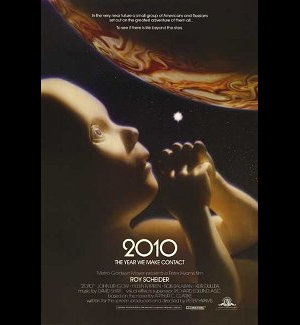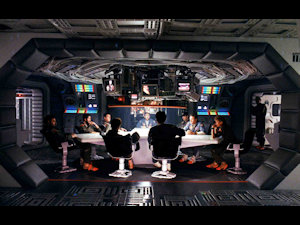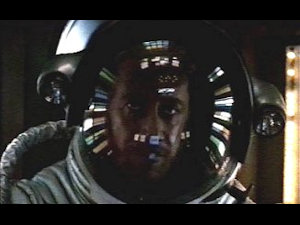The Summer of Arthur C. Clarke: 2010: The Year We Make Contact (film)
Before I begin, welcome to my Summer of Arthur C. Clarke. On the heels of last year's popular Slasher Summer, this year I'm leaving behind the guilty pleasure of the niche horror genre and exploring something a little closer to my own heart: namely science-fiction. Of all the sci-fi greats, none have influenced me more than the late Arthur C. Clarke, my personal favorite of the "Big Three" from the Golden Age of the genre (Asimov, Clarke, and Heinlein). This summer, I am going to look at a few of his most famous works, including the entirety of his 2001 series and the tiny handful of adaptations that have been made for film, television, and video games. Strap in and prepare yourselves for a journey into the stars and the mind, and let us never forget how much richer the world of fiction is for having been blessed by the incomparable Sir Arthur C. Clarke.
 | | I had this poster in my dorm room |
After Stanley Kubrick redefined the nature of science-fiction cinema with 2001: A Space Odyssey, it was an odd choice to give the sequel to Peter Hyams, a writer/director whose previous work included the cheesy Outland and, ironically enough, Capricorn One (a film with thinly veiled support for the conspiracy theory that Kubrick faked the Apollo 11 moon landing). After directing 2010: The Year We Make Contact, Hyams would go on to direct such cinematic landmarks as Timecop and End of Days. He's not a bad director by any means, but he's certainly no Stanley Kubrick. For this reason and others, it's best not to compare the film versions of 2010 and 2001. They are completely different films guided by very different film philosophies. 2001 is film art; 2010 is Hollywood entertainment.
With that disclaimed, 2010: The Year We Make Contact is still an excellent adaptation, and it thrives off of Clarke's better use of progressive narrative tension and character development. It's also one of those rare films that actually benefits from reading the source material first. It's definitely not as good as the novel, but after reading the novel, it's a far easier film to appreciate. This is because it is earnestly faithful to Clarke's book--to the details of both his science and his plot--with its primary deviations made in order to expand upon the ideas of the book rather than alter them. Sure, it leaves out a few key things, like the Chinese ship that is lost on the surface of Europa, the low-key sexual politics, and the underlying explanation for what the Star Child is doing, but it does its best to put a lot of disparate elements together to form a more cohesive theme.
 | | It definitely has a Ridley Scott's Alien feel to it |
That theme isn't exactly subtle, and it relies on increasing Cold War tensions both on Earth and aboard the two ships orbiting Jupiter. This makes the film even more anachronistic than the book, but it still feels true to Clarke's ideals. Though Clarke never gets as explicit as "USE THEM TOGETHER, USE THEM IN PEACE," his heart is clearly in the same place. Where the alterations hurt, though, is in the interpersonal relationships of the characters. Floyd's relationships to Moisevich and the Russian captain are completely different, for example, and it makes the story feel colder than it should.
However, the cast is excellent. In addition to Keir Dullea and Douglas Rain returning as Dave Bowman and HAL, Roy Sheider is perfect as Heywood Floyd, offering the delicate mixture of aging blue-collar working man with a dry wit and politically savvy scientist who's run out of patience for bureaucracy. Also excellent are Jon Lithgow as Curnow and Elya Baskin as Max, the two characters with boundless personality, though both characters aren't given as much to do in the movie as they are in the novel. Rounding out the crew are Helen Mirren as the Russian captain (Kirbuk in the film, Orlova in the book) and a wonderfully subtle Bob Balaban as Dr. Chandra. Both of these actors are great, but the whitewashing of the characters is a little problematic from a modern perspective.
 | | R.I.P. Max |
The movie has some clunkiness to it--some visual effects that feel dated (though the ships, as practical models, hold up better than CG), some awkward editing, a pretty embarassing synth soundtrack, and a few scenes that lack the appropriate context--but its weaknesses are offset by a few really well-done scenes, like Bowman's trippy visitation of Floyd that harkens back to Kubrick's film or Curnow's surprisingly gut-wrenching attempt to convince HAL to stay behind during the climax. Granted, it seems unusual that Floyd could persuade everyone that they need to leave without even mentioning Bowman's name, but at the same time, the movie avoids one bit of narrative convenience from Clarke's novel. In the novel, the Star Child's arrival just happens to coincide with the Leonov mission, but in the movie, events seem to be set in motion by the probing of Europa and, later, the monolith.
Ultimately, 2010: The Year We Make Contact isn't a landmark film like 2001: A Space Odyssey, but it is a good and entertaining adaptation. It doesn't dumb down the source material or shy away from the science that undergirds Clarke's tale, but it does make a few changes that might bother purists. (For me, killing Max is the only unforgivable change.) Hyams is a perfectly competent director working with an excellent cast, and fans of Clarke should embrace this film without shame, as Clarke himself did.
As a post-script, when I rewatched the film in preparation for this article, I watched it with my nine year old son. Normally, he doesn't have the patience or attention span to watch anything longer than a single episode of Spongebob Squarepants, and I can count the number of live action movies he enjoys on one hand. However, he was utterly enthralled by 2010, and he constantly talks about it, asking me great science questions like whether Jupiter could be turned into a star and what that would do to the Earth's environment. That makes me love this movie more than I thought possible.
-e. magill 6/21/2018
THE UNAPOLOGETIC GEEK'S
SUMMER OF ARTHUR C. CLARKE: | |
|
|
|